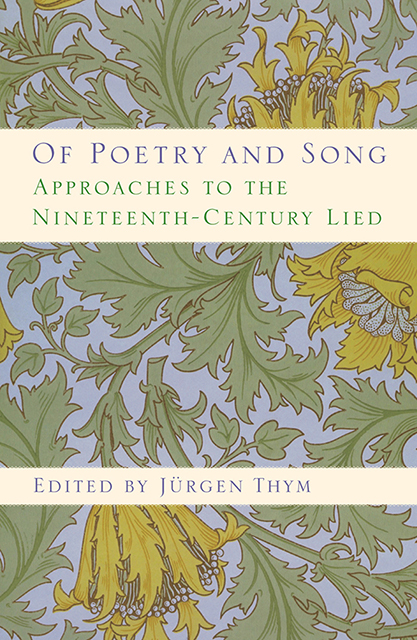Chapter Five - Karl Weigl’s Opus 1 in Its Nineteenth-Century Context: A Historic Literary-Musical Fusion of Goethe’s “Wanderers Nachtlied” and “Ein Gleiches”
Published online by Cambridge University Press: 02 March 2023
Summary
The compilation of Goethe settings published by Willi Schuh in the 1952 Artemis edition of Goethes Werke lists 115 composers who have set “Der du von dem Himmel bist” and 95 who have scored “Über allen Gipfeln.” Many others before and since have doubtless tried to join the also-rans already crowding Schuh's catalog. But only 7 composers occur on both lists; none of those—to the best of my knowledge—has attempted to relate or juxtapose, not to mention link or connect, these two “Nachtlieder” in any recognizable way. Karl Weigl's collection Seven Songs for Baritone, op. 1, however, includes an unmistakable cyclic merging of these settings, the poems of which had heretofore enjoyed only individual musical fame through the efforts of Schubert, Schumann, and Wolf—to name only the most celebrated Lieder composers in Schuh's tantalizing compendium.
Interdisciplinary Germanisten, and particularly Goethe scholars, would find Weigl's cyclic solution additionally fascinating because of Goethe's own penchant for ordering and juxtaposing crucial poems in cyclic sequences and contexts. Yet the fin-de-siècle Viennese culture surrounding Weigl thrived on just such innovative cyclic reshaping of previous materials, as the examples of Mahler's Eighth Symphony (with its setting of the final scene of Faust II) and Schoenberg's George-Lieder amply suggest. Why Karl Weigl—an avid Alpine mountain climber and conservative neo-Romantic composer who clearly rejected the musical revolution of his contemporaries Schoenberg, Berg, and Webern—would be drawn to Goethe's supremely serene lyrics evoking the inexorable tension between tranquil nature and restless humanity, between universal timelessness and individual temporality, is not difficult to comprehend. Moreover, the descriptive orchestral tone poems and monumental symphonic structures of Richard Strauss, Anton Bruckner, and Gustav Mahler provided exemplary harmonic color and melodic texture in great abundance from which the traditionalist Weigl could distill new combinations—in the concentrated realm of “Kunstlied”—that effectively merge and reveal the overarching similarities and subtle differences found in “Der du von dem Himmel bist” and “Über allen Gipfeln ist Ruh.” In fact, if one were to take traditional scholarship at face value, one might very well assume that the late-nineteenth-century programmatic realism of, say, the Strauss of Eine Alpensymphonie would adequately render “Über allen Gipfeln” as a mountainous solitude with vaguely human implications.
- Type
- Chapter
- Information
- Of Poetry and SongApproaches to the Nineteenth-Century Lied, pp. 111 - 135Publisher: Boydell & BrewerPrint publication year: 2010



